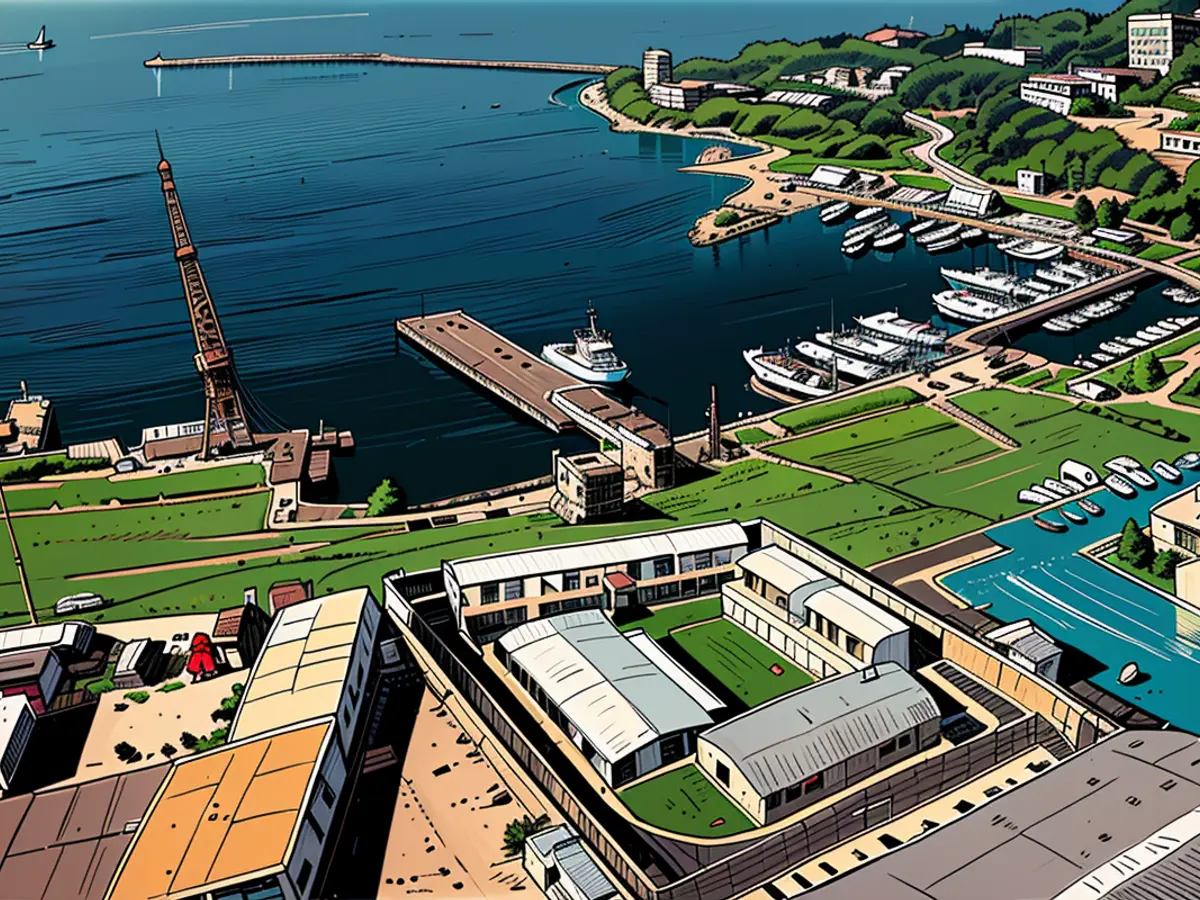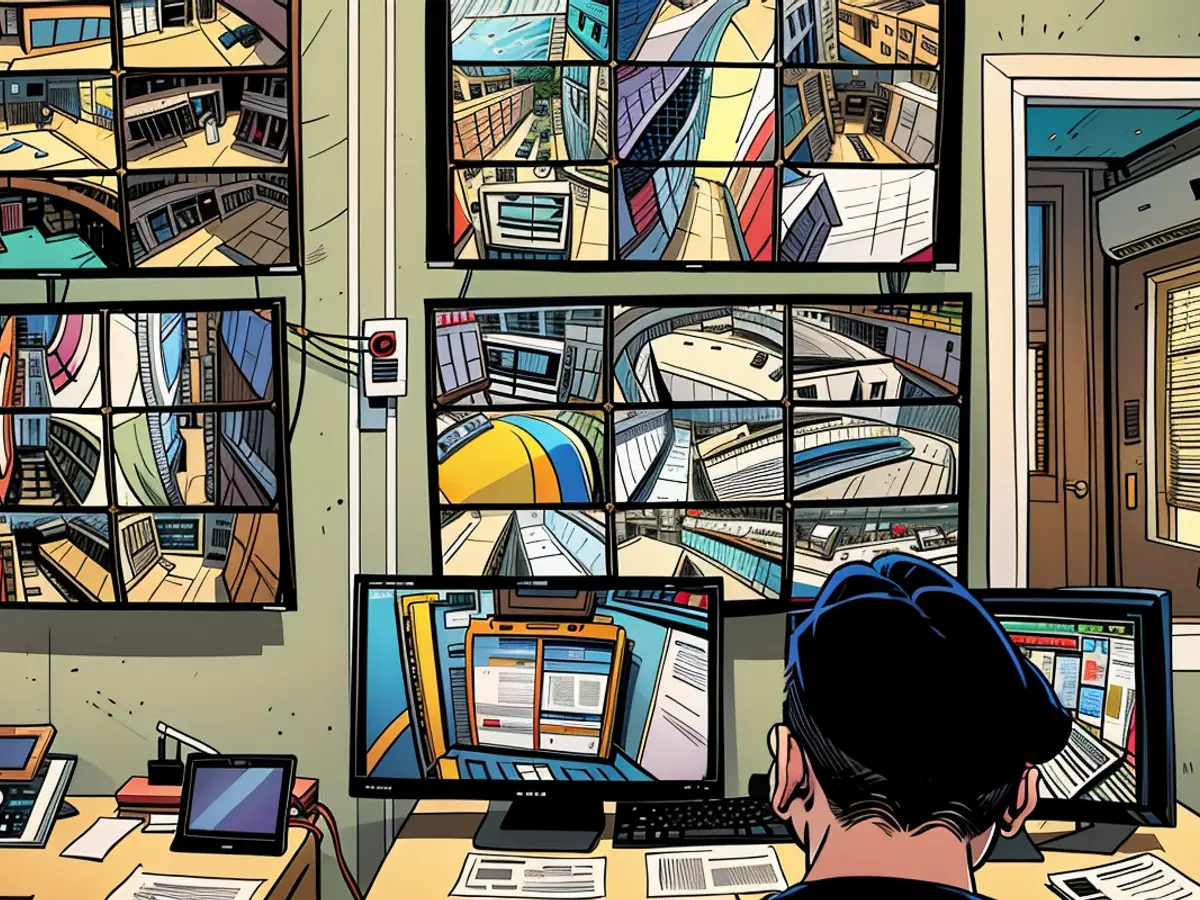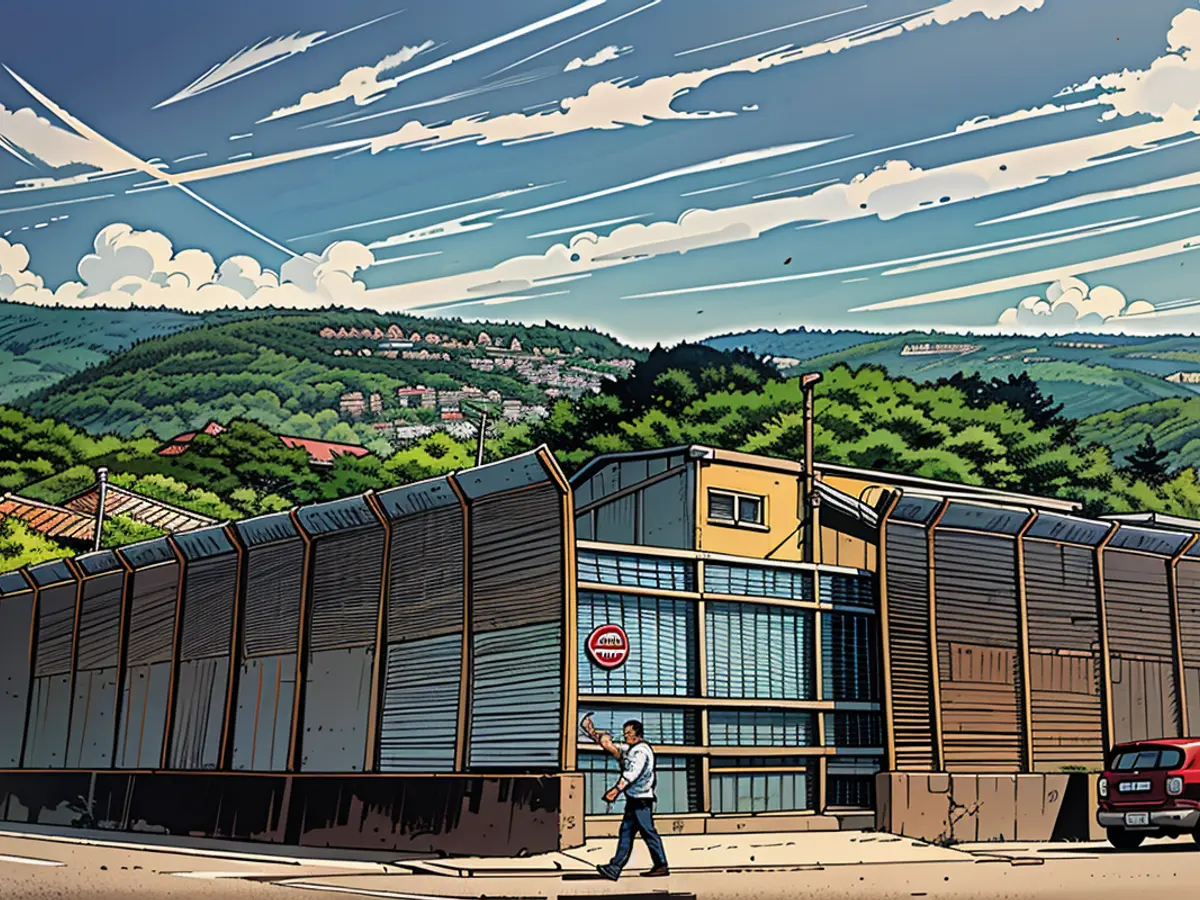Italy's conservative administration intends to transfer sea migrants to Albania, aiming to decrease the influx of arrivals.
This action, which the conservative administration claims will combat human trafficking and permit entry only for those with a legitimate claim within the European Union, has garnered criticism from human rights groups.
On a recent day, the European Court of Justice determined that Italy's plan to transfer migrants from "safe" countries as deemed by Italy, despite the EU's disagreement, is not lawful.
Even though the court's verdict is not binding, Italy and Albania are not restricted by the ruling from continuing with their plans. The centers planned for Shengjin's port city and Gjader's interior were initially set to launch in May following the nations' bilateral agreement in November, but delays in construction and bureaucracy have repeatedly pushed back the opening.
Italian Interior Minister Matteo Piantedosi stated last month, "We will begin in October. There have been some minor delays, and during our inspections, we discovered that the ground required reinforcement. It's all quite standard adjustments during construction."
A representative from Piantedosi confirmed to CNN that the centers would open in October, but did not specify an exact date. The United Nations High Commissioner for Refugees (UNHCR) has been requested by the Italian government to observe the centers once they are operational, but a starting date has not been provided. UNHCR monitors have been notified to be on site once they open, according to a UNHCR spokesperson.
In August, the Italian government inaugurated a trial detention facility near Agrigento, Sicily, modeled after those in Albania by housing men from "secure" nations for quick repatriation. A court in Catania ruled the measure illegal under Italian law, but the decision was subsequently overturned, and two Tunisian men were deported without processing their asylum requests on September 11, as per Piantedosi's post on X.
Central Mediterranean migration by sea to Italy and Malta has decreased by more than 60% compared to this period last year, according to Italy's Interior Ministry and Europe's Frontex agency. The reduction in the Mediterranean has led to an increase in migrants attempting to reach Greece and Spain, as demonstrated by Frontex statistics. This shift is primarily due to restrictions on NGO rescue vessels and Prime Minister Giorgia Meloni's frequent visits to Libya and Tunisia to exert pressure to prevent migrants from leaving.
Despite the decrease in numbers, the Italian government continues to prioritize an anti-immigration agenda, which is generally supported by voters, with Meloni receiving a 44% approval rating, as per an Ipsos poll in September 2024.
Meloni's "Rome Process," which she claims aims to discourage illegal migration and address its underlying causes, has attracted interest from UK Prime Minister Keir Starmer, who visited Italy in September and pledged €4.75 million in support, as per Meloni's office.

"We discussed the Italy-Albania agreement, which the British government is expressing considerable interest in, and we have provided them with all necessary information to better comprehend this mechanism," Meloni stated during a press conference following the visit.
Meloni mentioned that Starmer had expressed interest in utilizing the Albanian centers for migrants crossing the English Channel, but Albanian President Edi Rama informed the European Parliament on September 19 that the centers were solely designated for migrants bound for Italy. "This is an exclusive agreement with Italy because we adore everyone, but Italy has our unconditional love," Rama declared.
Albania shares a sea border with Italy but is not an EU member state.
In 2023, more than 157,000 people illegally arrived in Italy by boat from Libya and Tunisia, with numerous fatalities reported while attempting the perilous sea journey.
The asylum application process is time-consuming, leading countless potential asylum seekers to abandon their applications and assimilate into the Italian fringes or seek refuge in northern European nations.
Human Rights Watch has characterized the Italy-Albania scheme as "disgraceful," stating that intercepted migrants will be subjected to a longer sea journey to Albania, extended detention upon arrival, and potentially limited access to seeking asylum.
“Avoid approaching the local ladies”
The centers will accommodate up to 3,800 adult males at any given time, who will be aided in submitting their asylum requests in Italy, according to Italian authorities. If they do not qualify for asylum, they will be forced to return to "safe" countries, in accordance with the agreement between Italy and Albania.

One of the 45 male Italian police officers who were dispatched to manage the centers disclosed to CNN that they had been thoroughly trained not only in handling the incoming migrants and refugees but also in maintaining proper conduct with the locals.
"We have been advised not to behave too 'Italianly,'" the officer, who requested anonymity to avoid breaking protocol, revealed. "We received a manual detailing proper conduct: no public nudity, refrain from pursuing local women, and consume coffee seated, not standing at the counter."
The manual also advised the incoming officers to maintain a respectful distance from Albanians and to avoid appearing superior towards them. Flirting is strictly forbidden. The manual warns, "Avoid flirting with Albanian women in various situations and in an unplanned manner. It is a conservative society. The man who observes his woman being courted by another man might respond unfavorably."
In total, Italy will contribute around 500 individuals, encompassing law enforcement officials, military personnel, medical staff, and Justice Ministry personnel, at an estimated cost of approximately €252 million (equivalent to $278 million), as indicated by Meloni. A local business owner in Shengjin has even established a restaurant named "Trattoria Meloni" as a tribute to the Italian prime minister for the positive impact of Italy's investment in Albania, which has and will continue to boost the local economy financially.
Moreover, Italy will commit €670 million (approximately $738 million) beyond the initial five-year contract for the operation of these centers, and also allocate funds for a supplementary layer of security, manned by Albanian guards, to ensure that asylum seekers cannot escape. This accounts for roughly 7.5% of what Italy presently spends on its migrant reception facilities, Meloni mentioned in June in conjunction with Rama.
'Significant risk'
The Shengjin port facility will initially accommodate 880 individuals and will serve as the location for the initial processing of all arrivals. Individuals who satisfy the criteria for asylum claim consideration will then be relocated to the facility in Gjader, which will start with 144 beds and expand to house around 3,000 people while they await a response from Italy regarding their application. This facility also includes a maximum-security 20-bed prison and emergency medical services.
The agreement specifies that only migrants from 22 countries designated as “safe” by Rome will be relocated to Albania, including male migrants from Bangladesh, who currently represent the fastest-growing demographic arriving in Italy by sea, as per the Italian Interior Ministry.

Other listed "safe" countries are Egypt, Tunisia, and the Ivory Coast, whose citizens make up a significant portion of the arrivals. The European Court of Justice does not view Tunisia and Egypt as completely safe, which forms the basis of last week's ruling.
Migrants from countries deemed unsafe by Rome, such as Afghanistan and Syria, will initially be transferred to Albania, but later relocated to Italy for processing once their country of origin is confirmed.
This policy of "offshoring" asylum seekers has faced severe criticism from human rights organizations.
"The agreement instantaneously established the groundwork for the infringement of the principle of non-refoulement and the implementation of illegitimate detention practices," Gianfranco Schiavone, president of the Italy-based Association of Juridical Studies on Migration, expressed to CNN, alluding to the European Union’s regulations regarding the treatment of migrants. Refoulement refers to the practice of forcibly returning asylum seekers or refugees to locations where they would face persecution or danger.
"There is a significant risk that the operation intends to conceal a strategy to create inaccessible reception facilities, located far from scrutiny and journalistic investigations, and from the dread of having to locate accommodation for them in Italy, where no administrator, regardless of political affiliation, can locate them," Schiavone stated.
Piantedosi contends that the opening of the Albanian facilities is intended to act as a deterrent for migrants seeking to be smuggled into Italy. Meloni, who campaigned on the promise to "stop the boats," has attributed her government's policies on investments in North African countries and punishments for NGO migrant rescue vessels to this year's decrease in arrival numbers.
The United Nations' International Organization for Migration has stated that an increase in migrant fatalities at sea and a rise in migrant boats departing from Libya and Tunisia presumed sunk have also contributed to a decrease in arrivals.
Uncertainties concerning the handling of the numerous migrants seeking to enter Europe annually, often fleeing war, persecution, and poverty while traveling in rickety boats, are predominantly focused on border nations such as Italy, Greece, and Spain. However, the consequences of these situations extend beyond these frontline countries.

A coalition of 15 European countries, led by Denmark and including Italy, has petitioned the European Union to explore "new solutions," such as the Italy-Albania agreement, to address irregular migration and establish a "fairer, more humane, sustainable, and efficient asylum system worldwide."
Despite the European Court of Justice ruling that Italy's plan to transfer migrants from 'safe' countries is not lawful, the centers in Shengjin's port city and Gjader's interior are still expected to open in October. The World Health Organization (WHO) has been requested to provide medical services at these centers to ensure the well-being of the migrants.
The Italy-Albania agreement, which aims to relocate migrants from 'safe' countries to Albania, has attracted criticism from human rights organizations. Amnesty International, for instance, has expressed concerns about the potential violation of the principle of non-refoulement, which prohibits the forcible return of asylum seekers to countries where they may be at risk.







